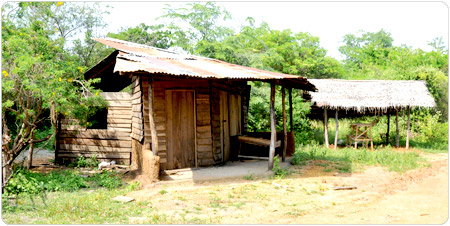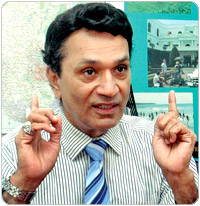|
Correct vision:
‘Enormous contribution to local film industry’
Ruwini Jayawardana
|

Ranmihitenna Tele Cinema Village |
Eliminating terrorism was probably his
most supreme achievement but President Mahinda Rajapaksa had done yeoman
service to the Sinhala arts scene as well. A man of few words yet
someone who had initiated many progressive schemes, not many are aware
of the significance of his contribution towards the field.
The Daily News met presidential adviser for developing film industry
Ravindra Randeniya to shed light on the topic.
“It is difficult to isolate this subject because he made on Sri Lanka
is enormous. The changes that are taking place in cinema today too is a
result of his achievements in diverse areas,” Randeniya said.
|

Ravindra Randeniya
Picture by Saman Sri Wedage |
Looking back on the history of the Sinhala film industry, Randeniya
said that the decline had been due to the advent of the free economy.
Local cinema met new challenges, competing with the world. After 1977 a
lot of racial violence erupted and later disaster took over as the
social fabric was torn to pieces.
“It is the lowest point in our history. It reflected Sri Lanka in a
very bad light in the international community. The value system also
changed. Terrorism took a strong hold.”
He said that one of the worst industries to be struck through the
1983 riots was the local film scene. People set fire to about 60
theatres. They burnt the only two studios that existed in the island.
The atmosphere which prevailed after the riots was such that people
did not possess the mindset to venture out, seeking for entertainment.
Fear, anxiety and insecurity ruled their daily lifestyle. This feeling
continued till terrorism was abolished in May 18, 2009.
The cinema also did not withstand the pressure of functioning under
very adverse circumstances. Artistes and filmmakers did not come with a
piratical solution to overcome this situation. No measures were taken to
rehabilitate the theatres or re-establish the two studios.
|
"One
of President Rajapaksa’s first moves after coming to power was
to summon a meeting for all the individuals who represent all
aspects of the industry. He discussed with them and listened to
their problems and solutions. He did not wait for the industry
to call for his aid. He volunteered to help out, out of his own
free will. " |
The National Film Corporation (NFC) too did not take any action to
remedy the situation at that time. Some hasty measures were taken to
addressing separate measures individually but not taking the problem of
the industry as a whole.
“Though we sought help from various heads of states, we did not get a
satisfactory answer. Rather the situation worsened when President
Chandrika Bandaranaike Kumaratunga proposed to take away the
distribution system from NFC and give it to the private sector. I feel
that this move is the main reason behind most of the problems behind the
industry,” Randeniya added.
Tax concessions
One of President Rajapaksa’s first moves after coming to power was to
summon a meeting for all the individuals who represent all aspects of
the industry. He discussed with them and listened to their problems and
solutions. He did not wait for the industry to call for his aid. He
volunteered to help out, out of his own free will.
President Rajapaksa gave tax incentive an investment in the industry
up to Rs 30 million was deductible from the income tax as a qualifying
payment.
The amount was extended by another five million in later years. Huge
tax concessions were given for reconstructing, rebuilding and improving
existing facilities of the exhibition sector.
All imports for the industry were exempted from customs duties and
other levies.
“He took the initiative and gave some concessions to the industry
which were unheard of before.
This sort of concession had not been given by any Government to the
local in Sri Lanka or any other country in the world. This scheme was
developed by him to help the local industry,” he said.
There was a huge influx of Indian teledramas which were coming into
the country and dubbed into Sinhala. It was a very profitable
transaction for the television channels but having a tallying effect on
the local teledrama scene.
It was limited to a half and hour program at first but later
mushroomed and even spread into the Government television channels.
“Representatives from the television industry made requests to the
President asking him to ban the Indian tele serials.
He came up with a better idea: imposing a tax so that importation
will be limited and use the tax money for the development of the local
industry,” Randeniya commended the President’s far-sighted strategies.
Ranmihithenna Tele Cinema village
He devised a method together with the Information Ministry to monitor
every program that was aired on channels. They introduced a special
scheme to obtain Rs 600 million which was invested to build the first
stage of the Ranmihithenna Tele Cinema village in Tissamaharama.
He noted that some of our own telemakers are unaware of how to
utilize a studio facility to maximum benefit.
“It may be away from the city but you can shoot the whole production
at one place in comfort. There are not additional costs like transport,
accommodation and meals. You can transform the area into any kind of
backdrop.
Artistes can work with respect and freedom. This kind of project
needs a lot of land and Tissamaharama has good weather all year round
which enables film or teledrama directors to shoot their production at a
stretch,” he said.
“Since you do not move around on transport matters will be easier and
quicker. Artistes will be active because they are deprived from the
burden of having to move around and will be able to get sufficient rest
at the air-conditioned chalets. Cinema halls, courthouses, hospitals,
police stations, offices, houses, paddy fields, villages and forest
reservoirs are available.
The setup is changeable,” he noted adding that President Rajapaksa
had stated that he wishes to create an atmosphere where local artistes
can work with honour and respectability.
Change of values
Randeniya notes that President Rajapaksa had changed the attitude,
thinking process and values of the people in the last six years. He had
encouraged them to appreciate local products and traditions.
“They used to shy off from things that were termed as ‘Sri Lankan’ in
the past but you can see people singing the lyrics of the Sri Lankan
National Anthem now. They have begun to respect and wear it on their
sleeve with pride. This change was brought about by the President’s
genuine love for the country and the people.
He maintains that the development of the country does not depend
solely on economics but the morale values too should be uplifted. He is
always upholding the value system which has to be inculcated into the
country and believes that artistes have a significant role to play in
this procedure,” he said.
Having toured the North and East a few weeks back Randeniya says that
he had seen a world of difference in the region. Jaffna is buzzing with
life and many travellers are flowing in to see the wonders of the city.
Agriculture is prospering.
“The full impact of these changes will be evident in a few years. It
takes time to reap the rewards of such projects,” Randeniya said adding
that various incentives are being taken to develop the industry with
special attention given to the theatres in the North and East.
Landslide victory
President Mahinda Rajapaksa made history with his election victory
this year.
“His triumph over terrorism is enough to project his concern over the
country and his strength to stand against international forces. This won
us their respect because he followed his own heart, not the commands of
external influences. He was determined, clear in his vision and he knew
what had to be done. Those are the factors which made people rally
around him.
This includes the artistes. Almost 99 percent of them were with him
because they have recognize his genuine concern for the people and the
industry. We hope that he will continue his good work and if the
industry gets together to join hands with him, we will definitely see a
brighter future,” he concluded. |

